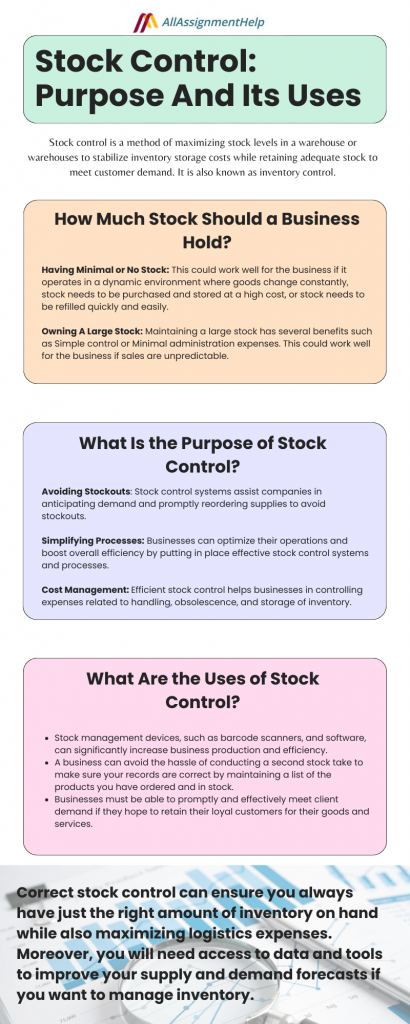Table of Contents
Stock control is essential for every business that deals with physical items. Stock control can lead to corporate failure if it is not done correctly. However, when it is done correctly, it can maximize earnings and cultivate customer loyalty. It has been considered that a company can run its business automatically without its employees but not without adequate stocks which may lead to loss of customers when their demand is not met. Also, we all have heard about stock management in business. Thus, every business needs to maintain the stock of their services or products to avoid stock out.
Stock control is necessary for every business and it serves as a huge asset for them. This is why it is important to understand its purposes and uses. In this blog of All Assignment Help, we are going to share the same and make you aware of what is stock control, its purpose, uses, and more…
What is Stock Control?
Stock control is a method of maximizing stock levels in a warehouse or warehouses to stabilize inventory storage costs while retaining adequate stock to meet customer demand. It is also known as inventory control.
Correct stock control can ensure you always have just the right amount of inventory on hand while also maximizing logistics expenses. Moreover, you will need access to data and tools to improve your supply and demand forecasts if you want to manage inventory.
There is additional financial risk involved with stock purchases. However, a business can avoid the risk with the right strategic plan. In the end, stock control may be the difference between a profit and a loss. When done correctly, it reduces expenses while raising profits on each transaction.
Read Here: Business Management: A Core Topic of Business Ethics

How Much Stock Should a Business Hold?
The size, type, and nature of the business will all play a role in determining how much stock it should keep. If you don’t have enough room, you might be able to purchase merchandise in bulk and pay your supplier a charge to store it.
Having Minimal or No Stock
Having minimal to no stock and having it delivered as needed has the following benefits:
- Effective and adaptable, you only have what you require at the appropriate time
- You can stay current and create new goods without wasting stock
- Less expensive storage
This could work well for the business if it operates in a dynamic environment where goods change constantly, stock needs to be purchased and stored at a high cost, or stock needs to be refilled quickly and easily.
Owning A Large Stock
Maintaining a large stock has several benefits.
- Simple to control
- Minimal administration expenses
- Purchasing in bulk could be less expensive.
- You never run out
This could work well for the business if sales are unpredictable.
Stock Control Systems
Stock control systems are the process of making a list, or inventory, of the stock and documenting its location and worth. An effective stock control system should allow you to:
- Track stock levels
- Make orders
- Issue stock
However, the stock book is the most basic manual approach, ideal for small enterprises with limited stock. You can record the stock that has been issued and received with it.
Choosing a Stock Control Software
Once you are aware of the potential problems with your inventory control system, the next step is to choose which stock control software best suits the needs of your business. The following are features of useful stock control software:
- The power to use several different currencies
- Capacity to cover several warehouses
- Able to expand the business
- Batch and serial tracking
- Capable of assisting numerous individuals simultaneously
However, cloud software is a good option for expanding businesses looking to manage their inventories efficiently.
Both batch and stock tracking are necessary for effective stock control. This involves being able to find the other items in the batch and track a specific item both forward and backward from the source to the finished product. However, a student studying business might encounter difficulties in stock management and control. Thus, they can get an online business management assignment help for themselves to under the various aspects of stock management and control.
What Is the Purpose of Stock Control?
Stock control is necessary for the business that sells tangible goods. Stock control ensures that a business always has enough inventory for its customers while keeping costs associated with purchasing and holding inventory to a minimum. Furthermore, it serves several important purposes in business operations such as:
Avoiding Stockouts
Stock control systems assist companies in anticipating demand and promptly reordering supplies to avoid stockouts. This improves customer happiness and loyalty by guaranteeing that customers can reliably find the things they require.
Simplifying Processes
Businesses can optimize their operations and boost overall efficiency by putting in place effective stock control systems and processes. This involves reducing manual errors related to inventory management, streamlining warehouse layouts, and automating reorder procedures.
Cost Management
Efficient stock control helps businesses in controlling expenses related to handling, obsolescence, and storage of inventory. Businesses can find areas for cost reduction and increase overall profitability by precisely managing inventory levels and turnover rates. A cost management assignment help could help you understand more about how stock relies on expenses overall.
Optimizing Stock Levels
Businesses can fulfill client demand without overstocking or understocking by maintaining ideal inventory levels with the help of stock control. Furthermore, this guarantees that commodities are available when needed in addition to preventing stockouts and the related costs of having extra inventory.
Decision-Making and Data Analysis
Stock control systems produce useful information on demand trends, turnover rates, and inventory levels. Additionally, businesses can enhance customer satisfaction and increase revenue by employing data analysis to make well-informed decisions regarding product assortment, pricing, and purchases.
Inventory control has several objectives, including streamlining operations, boosting customer happiness, improving financial performance, and assisting with best procurement practices. However, you can learn all about stock control and management by taking an online course. An online course will help you understand this concept from the start. However, it is not easy to take all your classes on your own. The intricacy of these online courses might make you wonder, if is there someone who can take my online course for me? This is a common query raised by many students. The best solution to such queries is to get help from an online class help service. This way, you can save yourself from losing track and cover everything that has been covered in the coursework.
What Are the Uses of Stock Control?
The top uses of stock control are as follows:
- Stock management devices, such as barcode scanners, and software, can significantly increase business production and efficiency. Moreover, the team members will be able to concentrate on other, more crucial aspects of the business by using these devices to help minimize manual tasks.
- It will be difficult for you to manage your inventory if your warehouse is disorganized. Therefore, this accelerates the order fulfillment process and maintains client satisfaction.
Time and money savings are the upsides of inventory management. - A business can avoid the hassle of conducting a second stock take to make sure your records are correct by maintaining a list of the products you have ordered and in stock.
- Additionally, successful stock control assists the company in determining the precise amount of inventory that must always be on hand. This keeps businesses able to maintain just the right amount of inventory without having an excess of goods in the warehouse and helps avoid product shortages.
- Businesses must be able to promptly and effectively meet client demand if they hope to retain their loyal customers for their goods and services.
- Stock management provides the means to have the appropriate products on hand when customers need them, enabling businesses to meet demand in this way.
However, the study of stock management also requires an understanding of finance. There are online platforms available that offer online finance courses, especially for stock control and management. You can enroll in the course online that fits your needs. Furthermore, if you get stuck while taking and require someone professional who will take your online finance class for you, we would recommend you hire an online class helper. They will resolve the queries you might have in understanding what has been taught in the online classes.
Also Read: Discover the Specifics of What a Risk Management Plan Is
Final Thoughts!
These are but a handful of the many aspects of stock control that need to be understood. However, there are other aspects that affect stock control and are important for students to understand. It is a vast concept and holds great importance for business. Therefore, it is wise to begin as you mean to continue, that is, by putting in place an inventory management software system that has been carefully crafted to provide excellent stock control.
FAQs
| What is the stock control method? FIFO is a conventional stock control method. To put it simply, the first products received should be dispatched first. It guarantees efficient use of vulnerable stock. However, consumable products are not often used in individual production. |
| Which is the primary stock control rule? The goal of the just-in-time stock control strategy is to keep each of your stock items at or above the minimal stock level. One way to reduce the risks and expenses associated with excessive inventory is to reduce the amount of merchandise you keep in the warehouse at any given moment. |
| What are the principles of stock control? There are 5 important principles of stock control: precise forecasting, effective restocking, safe handling and storage, regular evaluation and analysis, and clear communication. |
